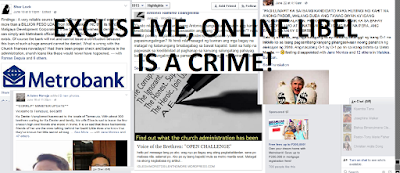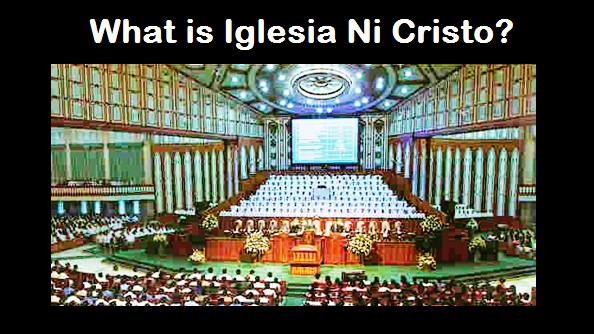ANSWERING “FALLEN ANGELS”
Punto-por-Punto na Pagsagot sa mga Fallen
Angels
part 50
EXCUSE ME,
ONLINE LIBEL IS A CRIME!
ONLINE LIBEL IS A CRIME!
“Online libel is a crime with 12 years imprisonment penalty”
THOSE who do not know, “cyber
libel is a crime.” Under Article 353 of the Revised Penal Code of the
Philippines, libel is defined as a public and malicious imputation of a crime,
or of a vice or defect, real or imaginary, or any act, omission, condition,
status or circumstance tending to discredit or cause the dishonor or contempt
of a natural or juridical person, or to blacken the memory of one who is dead.
Thus, the elements of libel are: (a) imputation of a discreditable act or
condition to another; (b) publication of the imputation; (c) identity of the
person defamed; and, (d) existence of malice. [Daez v. Court of Appeals,
G.R. No. 47971, 31 October 1990, 191 SCRA 61, 67].
[Sa mga hindi nakaka-alam, ang “online
libel ay isang krimen.” Ayon sa Arikulo 353 ng Revised Penal Code ng Pilipinas,
ang libelo ay nangangahulugang isang pambluliko at malisyosong maling hinalang
isang krimen, o isang vice o depekto,
tunay o imahinasyon, o anumang aksiyon, pagbabawas, kondisyon, kalagayan o circumstance na naglalayong siraan o
magbunga ng pagwalang-dangal o paghamak ng isang natural o juridical na persona, o upang sirain ang ala-ala ng isang patay na.
Kaya, ang mga elemento ng libelo ay: (a) maling paghihinala ng isang paninirang
aksiyon o kondisyon sa iba; (b)
paglalahathala ng maling hinala; (c) paninirang-puri sa isang tao; at, (d) ang
pagkakaroon ng malisya. [Daez v. Court of Appeals, G.R. No. 47971, 31 October
1990, 191 SCRA 61, 67].]
In libel
cases, the question is not what the writer of an alleged libel means, but what
the words used by him mean.
[Sa mga kasong libelo, hindi ang tanong ay
kung ano pakahulugan ng manunulat na pinararatangan ng libelo, kundi kung ano
ang kahulugan ng mga salitang kaniyang ginamit].
Jurisprudence
has laid down a test to determine the defamatory character of words used in the
following manner, viz:
“Words
calculated to induce suspicion are sometimes more effective to destroy
reputation than false charges directly made. Ironical and metaphorical language
is a favored vehicle for slander. A charge is sufficient if the words are
calculated to induce the hearers to suppose and understand that the person or persons
against whom they were uttered were guilty of certain offenses, or are
sufficient to impeach their honesty, virtue, or reputation, or to hold the
person or persons up to public ridicule. . . . ” [Lacsa v. Intermediate
Appellate Court, 161 SCRA 427 (1988) citing U.S. v. O'Connell, 37 Phil. 767
(1918)]
An
allegation is considered defamatory if it ascribes to a person the commission
of a crime, the possession of a vice or defect, real or imaginary, or any act,
omission, condition, status or circumstances which tends to dishonor or
discredit or put him in contempt.
[Ang isang alegasyon ay maituturing na
paninirang-puri kung ipinaparatang sa isang tao ang isang krimen, ang
pagtataglay ng vice (masamang kabihasnan) o kasiraan, tunay o imahinasyon, o
anumang aksiyon, pagbabawas, kondisyon, kalagayan o sirkemstansiya na
nagpapawalang-dangal o naninirang-puro o naglalagay sa kaniya sa kahihiyan (paghamak).
WHAT ABOUT ONLINE LIBEL?
Republic Act No. 10175 of the
Cybercrime Prevention Act of 2012 was signed into law in September 12, 2012.
Despite criticisms it received from netizens, but the Supreme Court acknowledge
libel’s existence in cyberspace.
[Ang batas ukol sa libelo sa internet ay
ang Republic Act No. 10175 na tinatawag din na “Cybercrime Prevention Act of
2012” na napagtibay na batas noong Setyembre 12, 2012. Sa kabila ng kritisismo
na tina tinanggap, subalit kinilala ng Supreme Court ang pag-iral ng krimeng
libelo sa cyberspace o sa internet.]
The 2010 Yuchengco Internet libel suit set a fitting jurisprudence
to all these. The decision "ordered the Makati City Regional Trial Court
(RTC) to dismiss the libel complaint filed by the advertising arm of the
Yuchengco Group of Companies (YGC) against a group of parents who put up an
Internet web site for individuals affected by the collapse of Pacific Plans
Inc. (PPI), a pre-need company that is a subsidiary of the YGC-owned Great
Pacific Life Assurance Corp."
According to the ruling, online libel cases should be tried in the place where the subject article or post was first published or read by the complainant. It overturned the 2007 resolution from then Secretary of Justice Raul Gonzales that "the crime of Internet libel was non-existent."
According to the ruling, online libel cases should be tried in the place where the subject article or post was first published or read by the complainant. It overturned the 2007 resolution from then Secretary of Justice Raul Gonzales that "the crime of Internet libel was non-existent."
WHAT IS THE
PENALTY FOR ONLINE LIBEL?
In a news article published by
“News Around The World” gives light on this matter:
“Filipinos who
libel others on Facebook, Twitter or elsewhere online could be jailed for up to
12 years under a law that went into effect Wednesday in the Philippines.
“The new law
against cyber-crime includes a disputed provision that imposes much steeper
penalties for committing libel on the Internet than offline. It allows police
to shut down websites and do some monitoring of email and online activity
without a warrant.” [“FILIPINOS
FACE 12 YEARS IN PRISON FOR ONLINE LIBEL” News From Around The World,
October 4, 2012]
http://latimesblogs.latimes.com/world_now/2012/10/philippines-prison-online-libel-new-cyber-law.html
A news article published by “ABS-CBN.com”
gives a further explanation on this mater:
“”MANILA,
Philippines - A person found guilty of libelous comments on the Internet could
spend up to 12 years in prison with no possibility of parole, a lawyer warned
Wednesday.
“Libel committed
on Twitter, Facebook, blogs, and other online content was made a more serious
crime compared to printed libel because of to the newly approved
anti-cybercrimes law or Republic Act 10175, according to Atty. Harry Roque,
professor of constitutional law at the University of the Philippines.
"Three
times longer imprisonment. Facebook and Twitter may lead to 12 years in
jail," he said. "Imprisonment for e-libel: 6 years and 1 day up
to 12 years."
"Conviction
for e-libel now comes with a definite prison term. Increased prison term
provided by new law makes convicts ineligible for parole," he explained.
“In comparison,
he said the penalty for printed libel set by Revised Penal Code is only 6
months and one day to 4 years and 2 months.” [“INTERNET LIBEL IN PH MAY LEAD TO
12 YEARS IN PRISON” by Jojo Malig, ABS-CBNnews.com, Sep. 19, 2012]
However, those slap with an
online libel case, don’t worry, the court is the right and legitimate venue to
prove all your accussations, but failing to do so, you will face a 12 years
imprisonment penalty.
[Labindalawangtaong pagkabilanggo ang
parusa sa mapatunayang nagkasala ng libelo sa internet. Subalit, ang mga
nakasuhan ng libelo ay hindi dapat mag-alala sapagkat ang korte ang
pinaka-angkop na venue para ilabas ninyo ang inyong mga ebidensiya at patunayan
ang inyong mga legasyon, subalit kung matalo sa kasong libelo sa internet ay
nahaharap sa 12 taong pagkabilanggo.]
NGAYONG POSITIVELY IDENTIFIED NANG SI "KELLY ONG" AY SI
"JOY YUSON" AT SI "BENITO AFFLECK" AY SI "BLESS GRACE
HERNANDEZ ARDONA," AT MAGING ANG IBA PA, KAYA KAHIT SINO AY MAARI NANG
MAGSAMPA NG LIBEL CASE LABAN SA KANILA LALO NA ANG POSITIVELY
"HARASSED" AND "BULLIED" SA KANILANG ACCOUNT AT FB PAGES.


No comments:
Post a Comment
Know why more and more people worldwide convert to Iglesia Ni Cristo (Church Of Christ). Learn more about this Church and find out what makes it unique.